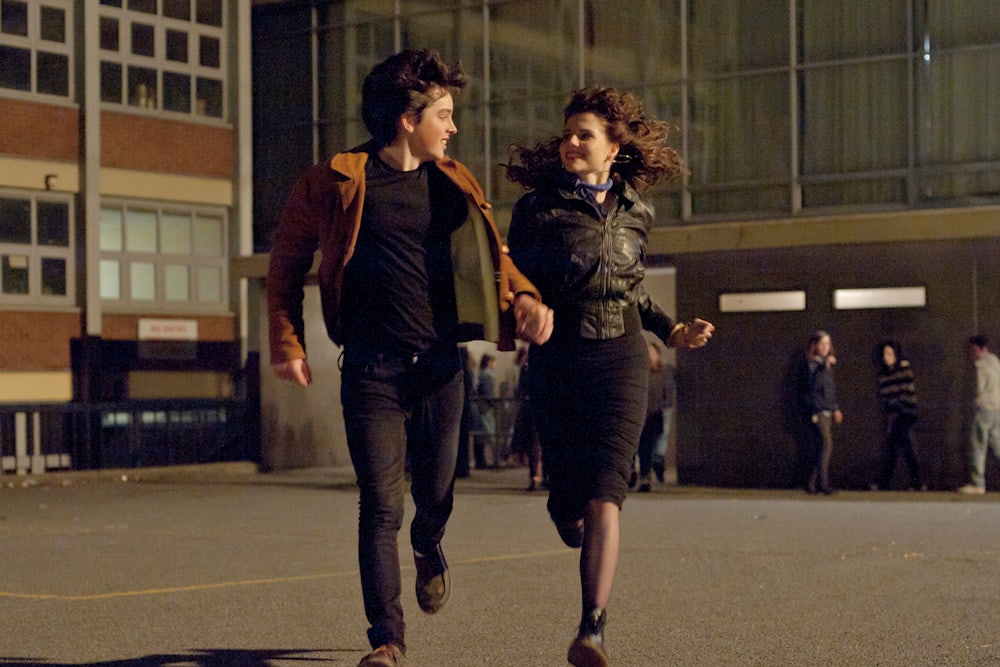Sing Street is so damn charming and sweet that you almost don’t trust it. A coming-of-age tale about a 14-year-old boy in Dublin who’s trying to woo the local beauty through his songs—there’s no way that’s not going to become cloying eventually, right? And although Sing Street does lose some of its magic along the way, the latest from writer-director John Carney (Once; Begin Again) soaks in its wistful, gently romantic mood without getting all wet.
Drawing from his own childhood, Carney has cast Ferdia Walsh-Peelo to play Conor, who’s making a difficult transition from his previous posh school to one in a much-tougher neighborhood after his feuding parents (Aidan Gillen and Maria Doyle Kennedy) announce that they can no longer afford the tuition. Picked on by toughs because he’s a bright, sensitive, artistic kid, Conor is just foolhardy enough to think he has a chance with the gorgeous, possibly troubled Raphina (Lucy Boynton), an aspiring model living in a nearby boarding house. Desperate to wow her, Conor mentions that he’s in a band that’s about to shoot a music video, which piques her interest. The problem is that he doesn’t have a band—and he doesn’t even really have a song, although he dabbles on the guitar. But when Raphina wants to be in the video, Conor quickly recruits some classmates to form a band—they’ll figure out what kind of music they play later.
Set in 1985, Sing Street offers a cheeky tour through the New Wave sounds made popular by U.K. bands like Duran Duran, The Cure, and Squeeze. Naming their band Sing Street, Conor and his pals are under the sway of these fashionable, often fashion-conscious groups, and much of the film’s initial fun comes from hearing these lads ape their heroes both sonically and sartorially. The band’s songs are written by Carney and Gary Clark, a songwriter and producer who’s worked with everyone from Liz Phair to Demi Lovato, and the tunes are both incredibly catchy and note-perfect homages to Sing Street’s musical influences. (If that wasn’t enough of a nostalgia blast, the group’s primitive music videos are their own kind of wayback-machine wonderful.)
Carney sprinkles a certain amount of fairy dust over the
proceedings, which might activate your wince instinct. (Certainly, this is one
of the nicest movies you’ll ever see about a teenager coping with a bleak
education system, not to mention unhappy parents who are staring down the
possibility of poverty and divorce.) But Sing
Street consistently counterbalances the story’s inherent pain with just
enough buoyancy that the sweetness always seems earned, like a conscious
bulwark against the sorrow Conor sees all around him.
Perhaps that’s why his unlikely courting of Raphina is far more touching and believable than its potentially predictable outline might suggest. Although Raphina is only a year older than he is, she’s far more experienced in love and life than the sheltered Conor. (Adding to this feeling, Walsh-Peelo is a baby-faced singer who’s making his debut as a film actor, and he’s several years younger than Boynton, who has plenty of film and television credits on her résumé.) And yet, it’s never preposterous that she’d take a shine to Conor, even though she has an on-again/off-again boyfriend. Conor’s sincerity and talent intrigue her, and the actors have such a sympathetic rapport that we understand why their characters would be drawn to one another, each seeing in the other somebody who’s a bit broken but trying to make the most of it.
Sing Street finds plenty of humor in the characters’ shared everyday miseries, especially Conor’s caustic older brother Brendan (an excellently acerbic Jack Reynor), who offers tough-love guidance on Sing Street’s musical direction as an excuse to ignore family drama and his own squandered creative ambitions. Even Conor’s goofy buddy Darren (first-timer Ben Carolan), who gets laughs for his self-proclaimed entrepreneurial spirit—basically, he knows how to work a camcorder for the video shoots—has a touch of melancholy to him. Conor and his chums aren’t exactly trying to set the world on fire with Sing Street, but their elegant, hooky sad songs are a way to make underwhelming lives a touch more tolerable, and there’s real poignancy in that.
Carney’s films have been filled with music-centric characters, and he’s uniquely attuned to a song’s ability to articulate the sweet-and-sour euphoria of being alive. So it’s probably not a surprise he’s such a sentimentalist—and that he’s got a weakness for the big, show-stopping moment. Sing Street’s tunes get less distinctive as the film rolls along, and likewise the story slumps toward a somewhat forced finale in which Conor has to make his big play for Raphina. There are times while watching Sing Street that you get the distinct impression that it’s a too-perfect template for the feel-good Broadway musical it could easily be in a few years. (Remember, Once has already made the transition from screen to stage.) But the beguiling modesty of the film ends up even more important than its music or incredibly likable characters. Like most of the bands it honors, Sing Street may be a bit disposable, but its electric emotions linger like a warm memory.
Grade: B+
Looking for more movie recommendations? Check out the latest episode of the Grierson & Leitch podcast.
Grierson & Leitch write about the movies regularly for the New Republic and host a podcast on film, Grierson & Leitch. Follow them on Twitter @griersonleitch or visit their site griersonleitch.com.
